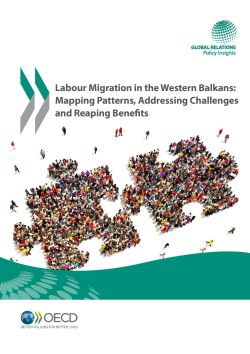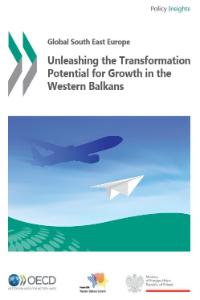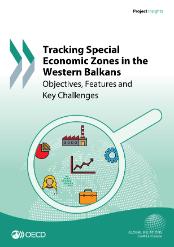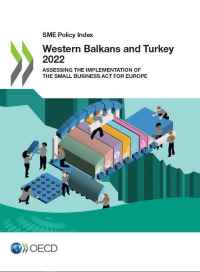Publications
Small and Medium Sized Enterprises
The SME Policy Index is a benchmarking tool designed for emerging economies to assess SME policy frameworks and monitor progress in policy implementation over time. Since 2006, it has been applied in four regions and nine assessment rounds overall.
Labour Migration

The report Labour Migration in the Western Balkans: Mapping Patterns, Addressing Challenges and Reaping Benefits analyses labour migration patterns of the Western Balkan economies, investigates their root causes as well as potential consequences, and examines the economies’ current migration and diaspora policies.
Economic Reform Programmes

The publication, Global South East Europe: Unleashing the Transformation Potential for Growth in the Western Balkans, was released at the OECD/Poland High Level Conference in July 2019 in Poznań.
The composition of a country’s exports can be a powerful predictor of economic development: the more the export basket of a developing economy resembles that of developed ones, the higher its chances are of rapid economic development. The OECD analysed the exports of the six Western Balkan economies in order to identify promising products and sectors that have potential to contribute towards higher economic sophistication and faster development. The publication:
- Tracks the changes in the export structures of the Western Balkans and profiles the Product Space of each economy
- Identifies products for each economy that can help transition to higher value-added outputs and strengthen linkages with global value chains
- Diagnoses four key sectors across the region with high potential for economic sophistication: agro-food, metals, automotive and machinery
- Issues targeted recommendations about how to develop these sectors and to create new, higher quality jobs, while providing examples of effective policy initiatives from the OECD economies

The publication Tracking Special Economic Zones in the Western Balkans: Objectives, Features and Key Challenges was launched at the OECD SEE High-Level Conference in 2017.
The report focuses on six SEE economies: Albania, Bosnia and Herzegovina, North Macedonia, Kosovo*, Montenegro and Serbia and examines the relevance of Special Economic Zones as a policy tool for sustainable and responsible investment in the region. Special economic zones have generated foreign direct investment inflows and job creation in the Western Balkans, but boosting competitiveness and sustainable development across the region will require additional focus on long-term investment as well as linkages between foreign and domestic companies.
The OECD study also raises questions aiming to improve policy outcomes and emphasises the importance of costbenefit and sustainability analyses in order to reduce potential deadweight effects, foregone revenues or competition distortion.
Competitiveness
 The publication series, Competitiveness in South East Europe: A Policy Outlook, offers one of the most comprehensive assessments of policies critical to competitiveness in South East Europe – Albania, Bosnia and Herzegovina, North Macedonia, Kosovo*, Montenegro and Serbia.
The publication series, Competitiveness in South East Europe: A Policy Outlook, offers one of the most comprehensive assessments of policies critical to competitiveness in South East Europe – Albania, Bosnia and Herzegovina, North Macedonia, Kosovo*, Montenegro and Serbia.
- Competitiveness in South East Europe: A Policy Outlook 2021
- Competitiveness in South East Europe: A Policy Outlook 2018 and Pocketbook
- Competitiveness in South East Europe: A Policy Outlook 2016
The SME Development in the Republic of Moldova project promoted the development of an effective SME policy in the Republic of Moldova. Its outcomes included three studies
- Republic of Moldova: Fostering SME Development (June 2011)
- Developing the business support infrastructure in Moldova (PDF in English/Romanian) (March 2014)
- Enhancing Access to Finance for SMEs in Moldova (PDF in English) (March 2014)
Private Sector Development
- Policy Handbook - Social Innovation Policy Framework for Croatia [ENG] (June 2016)
- Policy Handbook - Fostering Tourism Competitiveness in South East Europe [ENG] (February 2016)
- Policy Handbook - Bridging Skills Gaps in South East Europe: The case of the food and beverage processing sector [ENG] (February 2016)
- Policy Handbook - Triple Helix Partnerships for Innovation in Bosnia and Herzegovina [ENG] [BOS] [HRV] [СРБ] (May 2013)
- Policy Handbook - Establishing a Competence Technology Centre in Serbia [ENG] [СРБ] (June 2013)
- Project Insights - Assessment of the National Innovation System of North Macedonia [ENG] (December 2013)
- Project Insights - Implementing a Pilot Voucher Scheme in Montenegro [ENG] [MON] (March 2013)
- Project Insights - Assessment of the Kosovo* Innovation System [ENG] [ALB] (March 2013)
- Regional Competitiveness Initiative Brochure (2013)
Investment Reform
The Investment Reform Index (IRI) provides SEE governments with an overview of each economy's performance on investment policy reform and supports them in setting priorities and further improving the investment environment.
Drawing on the OECD Policy Framework for Investment, the IRI uses a unique scoring system to measure performance in each business climate dimension and related sub-dimensions.
- (April 2010)
- IRI 2006: Progress in Policy Reforms to Improve the Investment Climate in South East Europe (November 2007)
Sector Competitiveness
This report examines the apparel manufacturing, automotive components and business process and technology outsourcing sectors, focusing on market competitiveness factors, industry key success factors and policy recommendations
Trade
The Investment Compact provides implementation support to CEFTA parties to help them further liberalise trade in the region. CEFTA Issues papers provide analysis and monitoring results in relation to the elimination of non-tariff barriers, supporting the liberalisation of trade in services, and supporting the CEFTA investment related clauses. (2010)
- CEFTA Issues Paper 1: Intellectual Property Rights in the CEFTA 2006 Signatory Parties
- CEFTA Issues Paper 2: National Treatment Restrictions and Review of Bilateral Investment Treaties
- CEFTA Issues Paper 3: Trade Integration, Industry Concentration and FDI Inflows: The Experience in Central and South Eastern Europe
- CEFTA Issues Paper 4: The Elimination of Non-Tariff Barriers in CEFTA
- CEFTA Issues Paper 5: Industry Concentration and Country Specialisation in CEFTA
- CEFTA Issues Paper 6: Trade in Intermediate Goods and International Supply Chains in CEFTA
- Implementing the CEFTA 2006 Agreement: Reaping the Benefits of Trade and Investment Integration in South East Europe (brochure)
*This designation is without prejudice to positions on status, and is in line with United Nations Security Council Resolution 1244/99 and the Advisory Opinion of the International Court of Justice on Kosovo’s declaration of independence.
Related Documents



